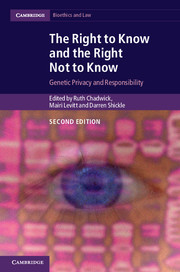Book contents
- Frontmatter
- Contents
- List of contributors
- Acknowledgements
- Introduction
- Part I Philosophical and legal issues
- Part II Issues in genetics
- 4 Biobanks and feedback
- 5 Suspects, victims and others: producing and sharing forensic genetic knowledge
- 6 Empowered by choice?
- 7 DIY genetics: the right to know your own genome
- 8 Genomics, inconvenient truths and accountability
- Part III Emerging issues
- Index
- References
6 - Empowered by choice?
Published online by Cambridge University Press: 05 September 2014
- Frontmatter
- Contents
- List of contributors
- Acknowledgements
- Introduction
- Part I Philosophical and legal issues
- Part II Issues in genetics
- 4 Biobanks and feedback
- 5 Suspects, victims and others: producing and sharing forensic genetic knowledge
- 6 Empowered by choice?
- 7 DIY genetics: the right to know your own genome
- 8 Genomics, inconvenient truths and accountability
- Part III Emerging issues
- Index
- References
Summary
At the heart of the right to know and the right not to know debate is the right to choose, which is predicated on the right to information, and other relevant resources, to enable a choice to be made. In many areas of everyday life choices have proliferated; in affluent countries there are more TV channels and types of eggs, ways of serving coffee or listening to music than ever before. Many of these choices may be trivial, but patients and parents are also increasingly bombarded with information and advice on more serious matters concerning health and child rearing. Patients and parents can obtain information to help make a choice of where to go for hospital treatment or which school they would like their child to attend. Hospital and school league tables and websites provide information on outcomes (e.g., survival rates after different types of surgery or examination pass rates), staffing levels and other factors that might influence decisions (hospital car parking or school uniform policy). Even in societies with universal health and education provision, it is acknowledged by providers that the more ‘informed and articulate’ have more choices, including the choice to go elsewhere into the private sector.
This chapter first discusses the choice agenda in health and the effects of choice on the chooser. Next, the possibility and desirability of changing the focus from individual autonomy and ever-increasing choice is considered and discussed through the example of the genetic screening of embryos and children.
- Type
- Chapter
- Information
- The Right to Know and the Right Not to KnowGenetic Privacy and Responsibility, pp. 85 - 99Publisher: Cambridge University PressPrint publication year: 2014



